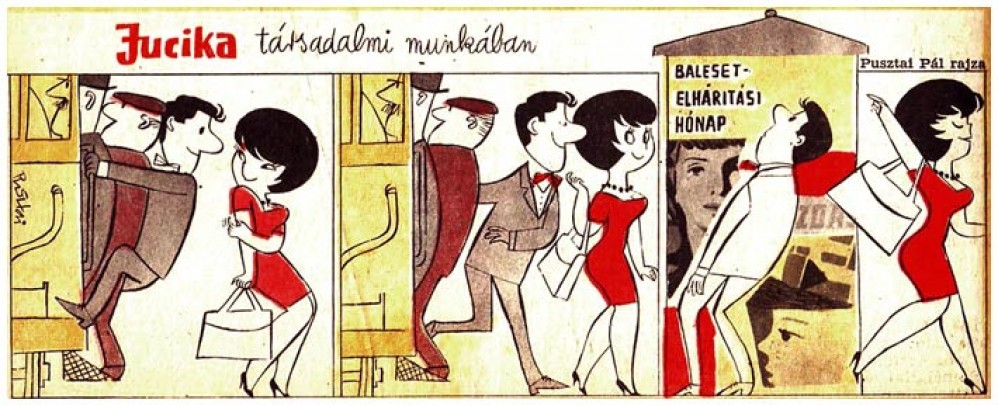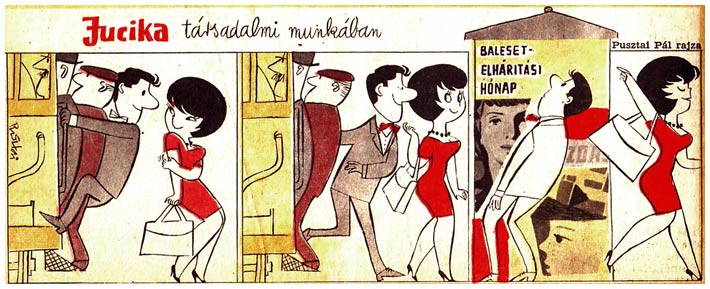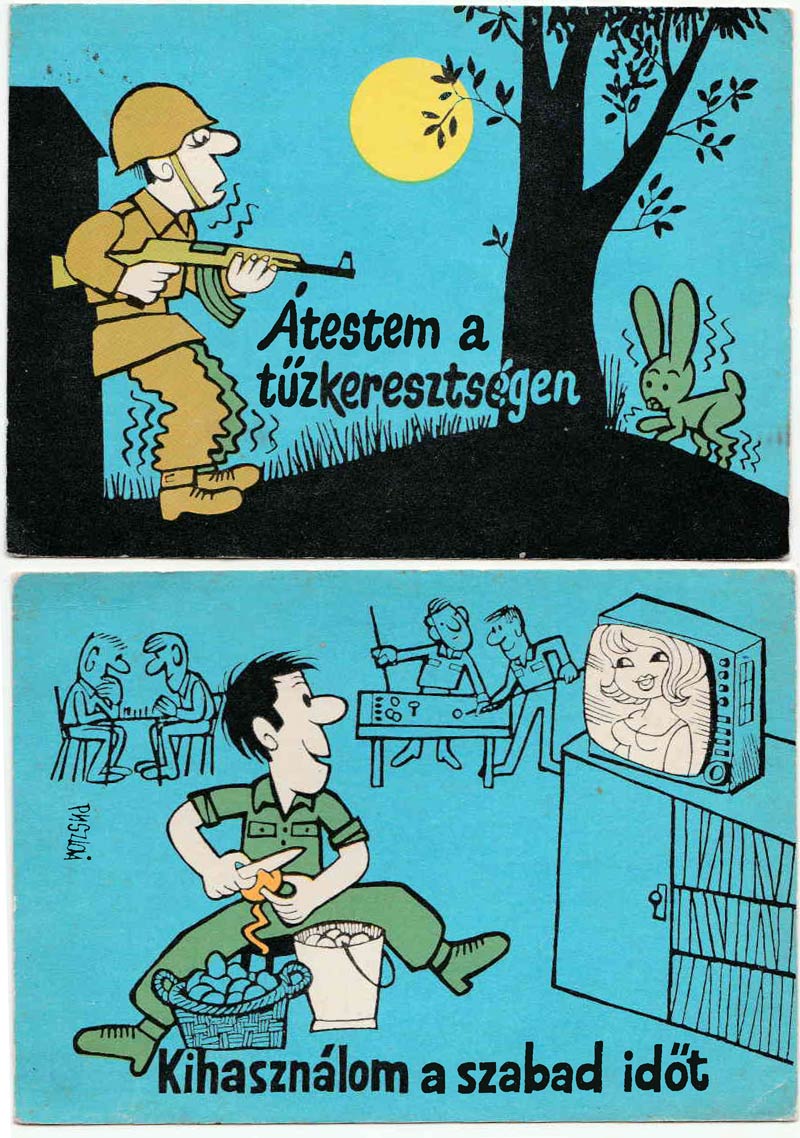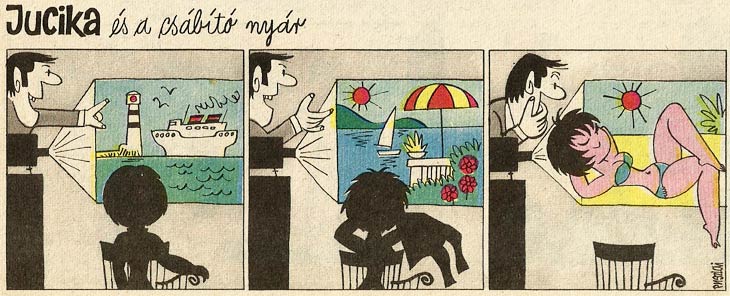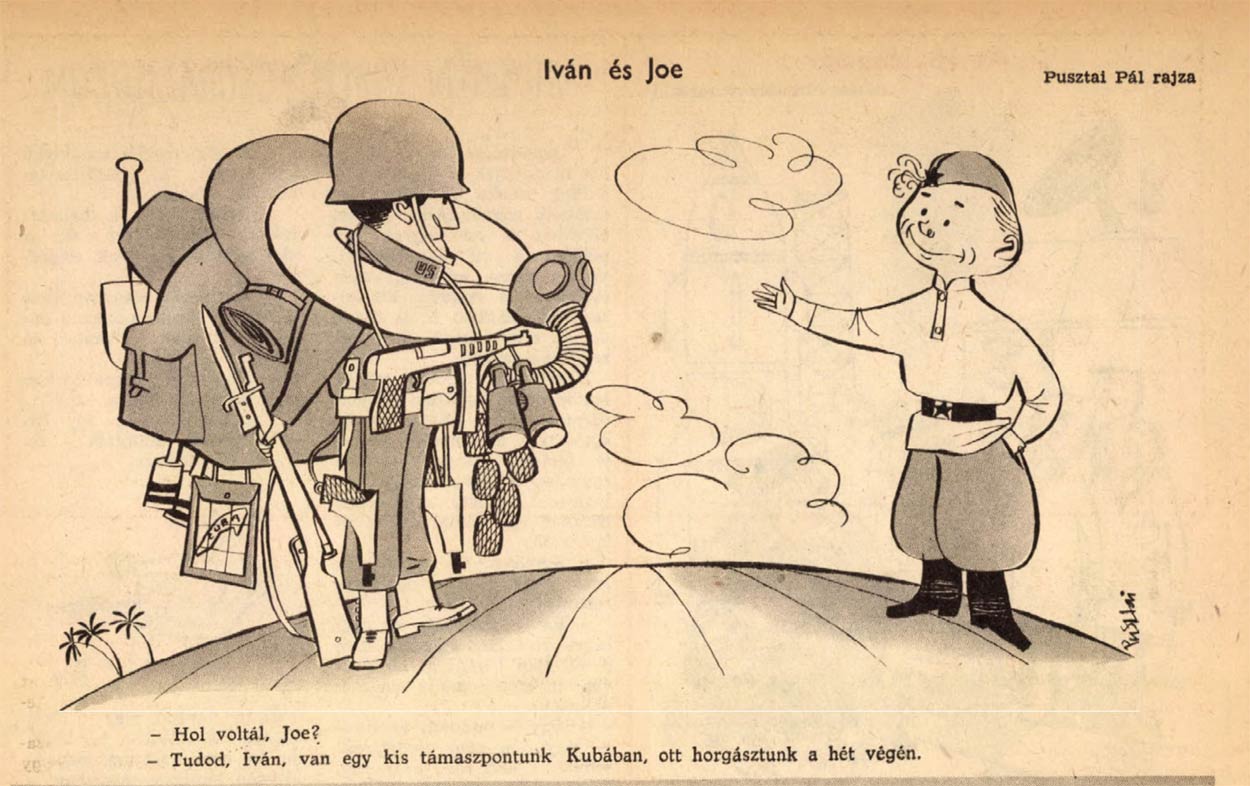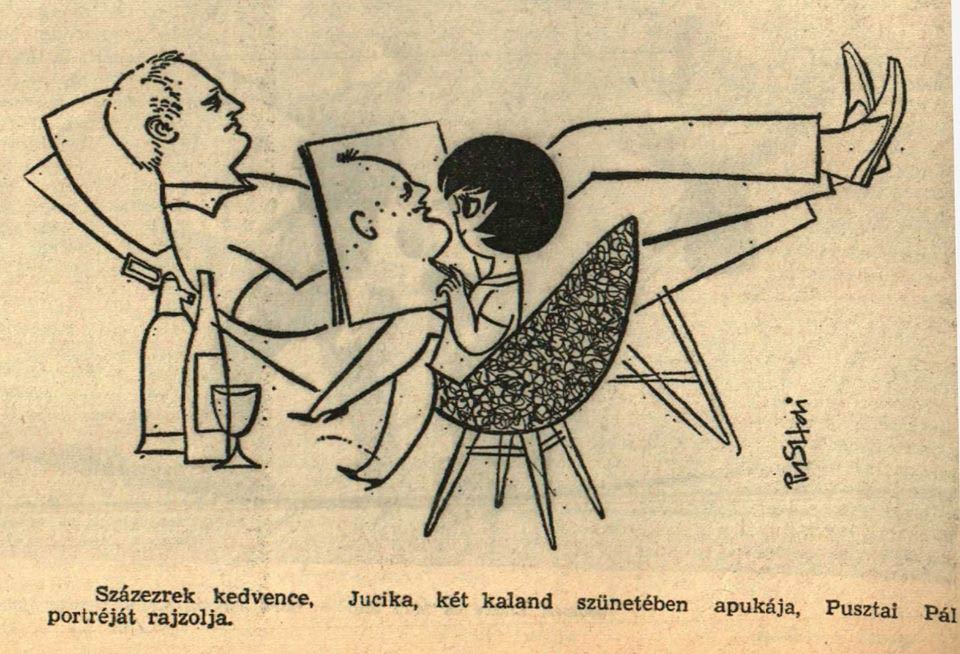Pál Pusztai was a Hungarian graphic artist, known for drawing postcards, advertisements and propaganda pamphlets. From 1959 until his death in 1970, he was a regular contributor to Lúdas Matyi magazine with the groundbreaking comic strip about the sexy 'Jucika' (1957-1970) and his military cartoon feature 'Iván és Joe' (1959-1970).
Commercial artist
Born in 1919 in Budapest, Pál Pusztai began his working life as a railway traffic attendant in Déj, a town in present-day Romania. Between 1951 and 1957, he became head of the graphic department of the Hungarian State Railways, drawing public service drawings and posters. He then turned to commercial art, illustrating and designing advertisements and military humor postcards, as well as posters promoting movies and propaganda purposes.
Military humor postcards by Pál Pusztai. The first card reads: "I was under siege." The second: "I use my spare time."
Cartoonist
In 1955, Pusztai also turned to newspaper cartooning, most notably appearing in Érdekes Újság ("Interesting Newspaper") and Ország-világ (Country-World), a magazine aimed at promoting the Soviet-Hungarian friendship. His art also appeared in Workers' Magazine, Women's Magazine, Illustrated Hungary, Füles and by 1959, he became a staff cartoonist of the country's sole officially sanctioned satirical weekly magazine, Lúdas Matyi. Pusztai's cartoons were characterized by their clear, well-composed layouts and ironic wit, that gently satirized the shortcomings of daily life under Communism. In 1963, Pál Pusztai's cartoon collection 'Pál Pusztai rajza' was released independently by the Fine Arts Foundation.
Jucika
Pál Pusztai's best-known creation was Jucika (1957-1970), an attractive woman with a bob cut who starred in over 500 pantomime comic strips, first in Érdekes Újság and, from 1959 on, in Lúdas Matyi. Original episodes were published in black-and-white, but in Lúcas Matyi they often appeared in color. Jucika is a free-spirited woman who works in a variety of jobs and often appears scantily clad in risqué situations. The strips spoof fashion trends and luxury products, while pushing the boundaries with regard to satirical and erotic humor during Hungary's mid-20th century cultural liberation. Jucika is often depicted as a lust object. Nevertheless, she always has the last laugh over the men who lure at her. Several episodes are additionally notable for criticizing sexual harassment. Jucika is sometimes confronted with men who try to grope or fondle her, but she speaks up and gives them a taste of their own medicine. Most of the comedy is timeless, except for a few episodes, like a 1961 gag in which Jucika tries to spot kosmonaut Yuri Gagarin during a parade.
During the 1960s and 1970s, Jucika was very popular in the Hungarian press, resulting in her appearing in advertisements and media adaptations. She was used to promote card calendars published by Budaprint. In 1964, she was played by actress Gabi Magda in a TV variety show. In the 1960s, the character also appeared in animated form, promoting a clothing company in a TV spot. Since most of her printed gags were done in pantomime, it allowed for easy translation. Nine episodes ran in the East-German magazine Frei Welt, though without the series' title. Yet other Eastern European countries rejected the comic, because they felt the comedy was too risqué. Outside Eastern Europe, 'Jucika' ran in Canadian papers under the title 'Judy'.
Remarkably enough, 'Jucika' enjoyed a remarkable revival in the Internet age. In 2003, a compilation of her gags was published in China. From the late 2010s on, especially in the wake of the #MeToo movement against sexual harassment, Jucika was rediscovered. Her gags were shared on online image boards and social media platforms, expanding her fame well outside the Hungarian borders. In November 2019, a special online imageboard ("booru") was launched with fan-made images of Pusztai's creation. Many people all across the world adored her charming and feminist gags, gaining her a modern-day cult following. A compilation of 1957-1958 'Jucika' gags was released in 2022 by Hungarian publisher kilencedik.hu.
'Iván és Joe' (Lúdas Matyi, 1960) Translation: "Where have you been, Joe?" - "You know, Ivan, we have a base in Cuba, we went there fishing for the weekend."
Iván és Joe
Also appearing in Lúdas Matyi magazine was Pusztai's Cold War-themed military cartoon feature 'Iván és Joe' (1959-1970), starring the Soviet soldier Ivan and an American G.I. Joe. Certain episodes deal directly with then-current world politics, others offer more straightforward, a-political military humor. As could be expected from a military-themed series published during the Cold War, the gags are basically Soviet propaganda. Iván is a clever soldier, while Joe is a dumb, born loser.
Recognition
With his work exhibited for the first time in 1955, Pál Pusztai participated in several national and international exhibitions and cartooning contests. In 1968, he received the second prize, awarded by the Kossuth publishing house, at the Hungarian Caricature exhibition. That same year, he won the third prize at the Montreal International Cartoon Exhibition. In 1969, Pusztai won the first prize in the international cartoon competition organized by the Moscow satirical weekly Krokodil. In 1966, he was awarded the Silver Cross of the Hungarian Order of Merit.
Death and legacy
On 11 September 1970, Pál Pusztai passed away in Dubrovnik, one week after his 51st birthday. He had just taken a swim and went ashore, whereupon he suddenly collapsed. Out of precaution he had taken his personal doctor with him, but it was already too late. Out of respect, all his comic series were instantly retired. On his drawing table one unfinished gag strip was found. Pusztai left a widow behind, but she never liked his artwork. According to rumors, she was very jealous of his signature character Jucika and therefore threw the majority of the 'Jucika' gags in a fire. It has been suggested that it wasn't as much the character itself that made her green with envy, but more that Jucika resembled another attractive woman Pusztai knew. Either way, due to Pusztai's wife's drastic actions, nearly all the original 'Jucika' drawings are gone forever. This made reprints nearly impossible. Another problem was that the couple had no children. All copyright of Pusztai's comics therefore went to the Hungarian state. With nobody keeping 'Jucika' in memory, his signature series seemed destined to vanish into oblivion. A literary phenomenon that people could now only read about, but barely see any imagery from.
Luckily, many magazine collectors had kept old issues of the publications Pusztai's drawings appeared in. Thanks to them, the cartoons could be scanned and digitally restored. In 2009, a previously unpublished poetry collection, 'Fondorlatos Jucika', written by poet Károly Borlóy as a tribute to Jucika, with illustrations by Pusztai, was finally released.
Pál Pusztai's legacy - most notably his 'Jucika' strips - lives on as an iconic part of Socialist era pop culture.


